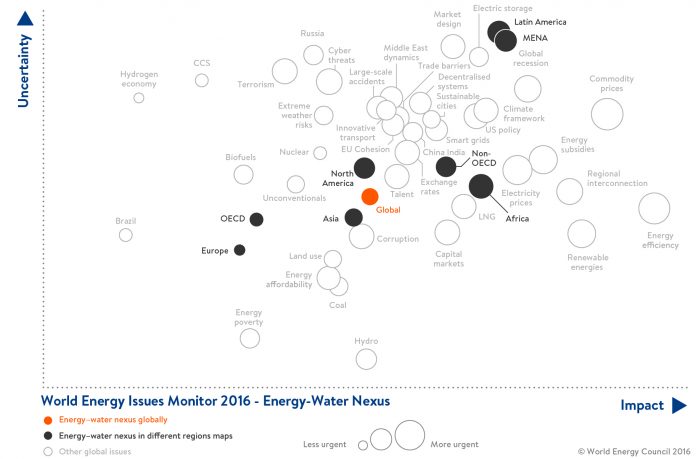
A new report released by the World Energy Council, The Road to Resilience: Financing Resilient Energy Infrastructure, has highlighted how the interdependencies, and sometimes competing demands, between water usage and the production of energy and food, triggers economic and social challenges for numerous stakeholders.
“If nothing is done, there is a risk of facing extremely difficult situations, and sometimes even dangerous ones,” Didier Sire, Senior Advisor to the Secretary General and Head of Sectoral Programmes, World Energy Council, told The Source. “The regions that will experience the fastest growth of their water needs, in particular due to an increase in population and economic growth, are often already affected by water stress.”
The report, launched at the IEFA Toronto Global Forum, focuses on how the energy sector needs to manage growing threats of extreme weather, energy-water-food nexus and cyber-attacks.
Energy is, after agriculture, the second-most water-intensive sector, with 98 percent of electricity supply critically dependent on the availability of water. For example in 2015, hydropower facilities in Brazil sustained economic losses of more than US$4.3 billion due to drought-related energy-rationing and water-rationing measures.
“The issues of international politics must also be taken into account–261 international trans-boundary basins cover 45 percent of the earth’s land surface, serve 40 percent of the world’s population and provide 60 percent of the earth’s entire freshwater volume,” added Sire. “It is imperative to develop regional cooperation in the management and sharing of water resources if we want to avoid tensions between countries that could escalate and have very serious consequences.”
Food production requires large volumes of water and energy: energy is used for pumping, moving and treating water; and water is used in the production and supply of energy.
The energy–water–food nexus can impact the stability of energy supply and demand for years or decades. It is also likely that the impacts of climate change will increase water stress in many countries, cities and rural communities. This brings with it the prospect of greater competition between different uses, as well as individual users of water. Such changes imply further restrictions to energy sector development and design.








